|
|
|
Sort Order |
|
|
|
Items / Page
|
|
|
|
|
|
|
| Srl | Item |
| 1 |
ID:
131857
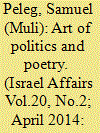

|
|
|
|
|
| Publication |
2014.
|
| Summary/Abstract |
The article demonstrates the potency and volatility of political lyricism by comparing two masters of the trade, the French Jacques Prevert and the Israeli Aryeh Sivan. Although writing in two dissimilar cultures and witnessing disparate political environments, the poetry of Prevert and Sivan is similar in many ways. They are both keen observers of their societies' woes and both are equally critical. Their accounts are s are emphatic and caring and strewn in their passionate, affectionate and brutally honest verses, Prevert and Sivan are the quintessential models for contemporary political poetry. Both poets, despite their disparate cultures and dissimilar local experiences, painstakingly probe and penetrate the political realities around them with velvet nails
|
|
|
|
|
|
|
|
|
|
|
|
|
|
|
|
| 2 |
ID:
131858
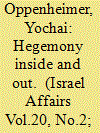

|
|
|
|
|
| Publication |
2014.
|
| Summary/Abstract |
This article examines the political protest expressed by Nathan Alterman over the years in poems published in the newspapers. It argues that this criticism identifies with the hegemonic political values rather than articulate alternative ones, in an attempt to nurture self-criticism on the part of the government regarding its failures and mistakes. This type of criticism seeks to preserve the reigning hegemony from within and to ensure that it projects an image of moral rectitude.
|
|
|
|
|
|
|
|
|
|
|
|
|
|
|
|
| 3 |
ID:
131856


|
|
|
|
|
| Publication |
2014.
|
| Summary/Abstract |
This article traces the motif of the living-dead in Nathan Alterman's poetry, beginning with Stars Outside and through Ten Plagues of Egypt to The City of the Dove, indicating the way in which Alterman's literary-symbolic structure was gradually replaced by a historical-literary one that reflects the influence of historical events - the two world wars, the Holocaust, and the War of Independence. With the wiping out of Jewish existence and literature, the Jewish hero became the Jewish victim and national symbol who in sacrificing himself ensured the life of the nation.
|
|
|
|
|
|
|
|
|
|
|
|
|
|
|
|
| 4 |
ID:
131873
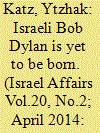

|
|
|
|
|
| Publication |
2014.
|
| Summary/Abstract |
This article examines the protest movement of the younger generation of Israeli songwriters and performers that emerged in response to the vicissitudes of the Arab-Israeli conflict over the past decades, notably the 1982 Lebanon war, the outbreak of the Palestinian intifada (December 1987), and Israel's unilateral disengagement from Gaza (2005). It argues that while this movement succeeded in inserting itself into the cultural and public arenas and shaking some of the unwavering beliefs and convictions held by the 'founding generation', its overall impact has remained limited.
|
|
|
|
|
|
|
|
|
|
|
|
|
|
|
|
| 5 |
ID:
131855
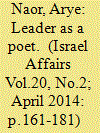

|
|
|
|
|
| Publication |
2014.
|
| Summary/Abstract |
This article analyses Ze'ev Jabotinsky's Zionist ideology as expressed in his political poetry. It includes inter alia lessons from the pogroms, the need for emergence of 'a new Jew' who would show by his conduct that he is 'a son of kings', who is ready to either die or capture the mountain, believing in the Jewish national right over the Land of Israel on both banks of the Jordan, as well as in the rights of its Arab and Christian inhabitants. These and other ideological principles appear in his poetry alongside a war of words with the Zionist left.
|
|
|
|
|
|
|
|
|
|
|
|
|
|
|
|
| 6 |
ID:
131854
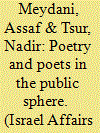

|
|
|
|
|
| Publication |
2014.
|
| Summary/Abstract |
Political poetry is not tested by its impact and the number of its readers but in its very participation in the public discourse on the issues of the day. Poetry moves between forces that focus the attention of its audience inwards, to the lyrics of the poems, and the forces that connect to the social, cultural, and political climate in which the poems are published. These movements reflect the power of poetry, which, using language, breaks the barriers that exist between people - individuals or groups, as well as between these individuals or groups and reality. This way, the poet serves as the element that formulates the informal cultural feelings in society and offers an interpretive package of the existing reality, as well as the alternative reality. Poets place their 'truth' within the perception of reality, and this truth can compete in the public arena with the 'truth' that is portrayed by politicians.
|
|
|
|
|
|
|
|
|
|
|
|
|
|
|
|
| 7 |
ID:
131860


|
|
|
|
|
| Publication |
2014.
|
| Summary/Abstract |
The poetry of Yemen from its inception, at least as it has been known to us since the twelfth century, was liturgical poetry, connected to religious worship. A revolutionary change occurred with the verse of Yosef ben Israel (late sixteenth and early seventeenth centuries), and even more so with that of his younger relative, Shalom Shabaz? (1619-80s). This happened as a result of the severe deterioration in the status of the Yemenite Jews after the rise of the Zayd? dynasty in 1629. The poetry of the Jews of Yemen, in particular that of Shabaz?, became the primary tool for their spiritual expression, and the subject of exile and redemption took on vitality and had concrete political significance in three ways: (a) vivid and vital depictions of the imagined eschatological-messianic reality of the redemption that is about to happen; (b) description of the events themselves, originating from a deep sense that it is necessary to keep a faithful record for the generations to come; (c) expressions of revenge and contempt toward the Zayd? ruling power, which represented the whole of Islam.
|
|
|
|
|
|
|
|
|
|
|
|
|
|
|
|
| 8 |
ID:
131859
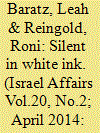

|
|
|
|
|
| Publication |
2014.
|
| Summary/Abstract |
This article seeks to reflect the narrative of discrimination in the writing of Israeli Palestinian women poets through the motif of Silence. This narrative emerges from the analysis and categorization of this motif in some 200 poems, written in Arabic and translated into Hebrew, thus revealing the poets' attitudes to social and political issues. This article shows that the poets' identity is perceived as the marginalized 'other' in Israeli society, not only in terms of nationality and ideology but also in terms of gender.
|
|
|
|
|
|
|
|
|
|
|
|
|
|
|
|
| 9 |
ID:
131869
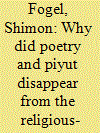

|
|
|
|
|
| Publication |
2014.
|
| Summary/Abstract |
This article reviews the process by which the presence of piyut - liturgical poetry - in (Ashkenazi) Religious-Zionist High Holy Day prayer books was curtailed. Piyut is examined here, in part, as a representative of non-institutionalised prayer reflecting grassroots tradition (and varying ethnic custom) as opposed to the letter of halakhic law. From this perspective, the process of decreasing the use of piyutim will be examined as the result of both the Orthodox movement and modern literary critique of piyut poetics.
|
|
|
|
|
|
|
|
|
|
|
|
|
|
|
|
|
|
|
|
|